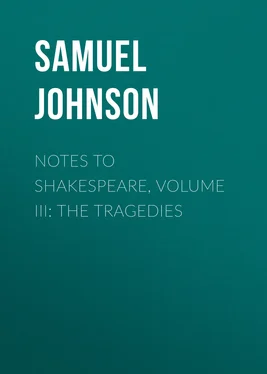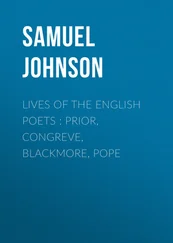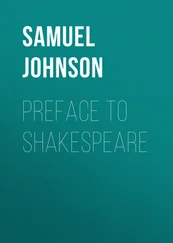Samuel Johnson - Notes to Shakespeare, Volume III - The Tragedies
Здесь есть возможность читать онлайн «Samuel Johnson - Notes to Shakespeare, Volume III - The Tragedies» — ознакомительный отрывок электронной книги совершенно бесплатно, а после прочтения отрывка купить полную версию. В некоторых случаях можно слушать аудио, скачать через торрент в формате fb2 и присутствует краткое содержание. Жанр: foreign_prose, Критика, literature_18, foreign_antique, на английском языке. Описание произведения, (предисловие) а так же отзывы посетителей доступны на портале библиотеки ЛибКат.
- Название:Notes to Shakespeare, Volume III: The Tragedies
- Автор:
- Жанр:
- Год:неизвестен
- ISBN:нет данных
- Рейтинг книги:5 / 5. Голосов: 1
-
Избранное:Добавить в избранное
- Отзывы:
-
Ваша оценка:
- 100
- 1
- 2
- 3
- 4
- 5
Notes to Shakespeare, Volume III: The Tragedies: краткое содержание, описание и аннотация
Предлагаем к чтению аннотацию, описание, краткое содержание или предисловие (зависит от того, что написал сам автор книги «Notes to Shakespeare, Volume III: The Tragedies»). Если вы не нашли необходимую информацию о книге — напишите в комментариях, мы постараемся отыскать её.
Notes to Shakespeare, Volume III: The Tragedies — читать онлайн ознакомительный отрывок
Ниже представлен текст книги, разбитый по страницам. Система сохранения места последней прочитанной страницы, позволяет с удобством читать онлайн бесплатно книгу «Notes to Shakespeare, Volume III: The Tragedies», без необходимости каждый раз заново искать на чём Вы остановились. Поставьте закладку, и сможете в любой момент перейти на страницу, на которой закончили чтение.
Интервал:
Закладка:
The authour has May in the same sense elsewhere.
V.iv.8 (521,1) the confident tyrant/Keeps still in Dunsinane, and will endure/Our setting down before't] He was confident of success; so confident that he would not fly, but endure their setting down before his castle.
V.iv.11 (521,2) For where there is advantage to be given,/ Both more and less have given him the revolt] The impropriety of the expression, advantage to be given , and the disagreeable repetition of the word given in the next line, incline me to read,
— where there is a 'vantage to be gone,
Both more and less have given him the revolt.
Advantage or 'vantage , in the time of Shakespeare, signified opportunity . He shut up himself and his soldiers , (says Malcolm) in the castle, because when there is an opportunity to be gone they all desert him .
More and less is the same with greater and less . So in the interpolated Mandeville , a book of that age, there is a chapter of India the More and the Less .
V.iv.20 (522,4) arbitrate]— arbitrate is determine .
V.v.11 (523,3) fell of hair] My hairy part, my capillitium . Fell is skin .
V.v.17 (523,7) She should have dy'd hereafter;/ There would have been a time for such a word] This passage has very justly been suspected of being corrupt. It is not apparent for what word there would have been a time , and that there would or would not be a time for any word seems not a consideration of importance sufficient to transport Macbeth into the following exclamation. I read therefore,
She should have dy'd hereafter.
There would have been a time for—such a world!—
Tomorrow , &c.
It is a broken speech in which only part of the thought is expressed, and may be paraphrased thus: The queen is dead . Macbeth. Her death should have been deferred to some more peaceful hour; had she liv'd longer , there would at length have been a time for the honours due to her as a queen, and that respect which I owe her for her fidelity and love. Such is the world—such is the condition of human life, that we always think to-morrow will be happier than to-day, but to-morrow and to-morrow steals over us unenjoyed and unregarded, and we still linger in the same expectation to the moment appointed for our end. All these days, which have thus passed away, have sent multitudes of fools to the grave, who were engrossed by the same dream of future felicity, and, when life was departing from them, were, like me, reckoning on to-morrow .
Such was once my conjecture, but I am now less confident. Macbeth might mean, that there would have been a more convenient time for such a word , for such intelligence , and so fall into the following reflection. We say we send word when we give intelligence.
V.v.21 (524,8) To the last syllable of recorded time] Recorded time seems to signify the time fixed in the decrees of Heaven for the period of life. The record of futurity is indeed no accurate expression, but as we only know transactions past or present, the language of men affords no term for the volumes of prescience, in which future events may be supposed to be written.
V.v.23 (524,9) The way to dusty death] Dusty is a very natural epithet. The second folio has,
The way to study death .—
which Mr. Upton prefers, but it is only an errour by an accidental transposition of the types.
V.v.42 (525,2) I pull in resolution, and begin/To doubt the equivocation of the fiend,/ That lies like truth] Though this is the reading of all the editions, yet, as it is a phrase without either example, elegance or propriety, it is surely better to read,
I pall in resolution,—
I languish in my constancy, my confidence begins to forsake as .
It is scarcely necessary to observe how easily pall might be changed into pull by a negligent writer, or mistaken for it by an unskilful printer. With this emendation Dr. Warburton and Mr. Heath concur. (see 1765, VI,478,8)
V.viii.9 (529,3) the intrenchant air] That is, air which cannot be cut.
V.viii.20 (529,5) That palter with us in a double sense] That shuffle with ambiguous expressions.
V.viii.48 (531,7) Had I as many sons as I have hairs, I would not wish them to a fairer death]
This incident is thus related from Henry of Huntingdon by Camden in his Remains , from which our authour probably copied it.
When Seyward, the martial earl of Northumberland, understood that his son, whom he had sent in service against the Scotchmen, was slain, he demanded whether his wounds were in the fore part or hinder part of his body. When it was answered, in the fore part, he replied, "I am right glad; neither wish I any other death to me or mine."
General Observation. This play is deservedly celebrated for the propriety of its fictions, and solemnity, grandeur, and variety of its action; but it has no nice discriminations of character, the events are too great to admit the influence of particular dispositions, and the course of the action necessarily determines the conduct of the agents.
The danger of ambition is well described; and I know not whether it may not be said in defence of some parts which now seem improbable, that, in Shakespeare's time, it was necessary to warn credulity against vain and illusive predictions.
The passions are directed to their true end. Lady Macbeth is merely detested; and though the courage of Macbeth preserves some esteem, yet every reader rejoices at his fall.
Vol. VII
CORIOLANUS
1.i.19 (292,1) but they think, we are too dear] They think that the charge of maintaining us is more than we are worth.
I.i.23 (292,3) ere we become rakes] It is plain that, in our authour's time, we had the proverb, as lean as a rake . Of this proverb the original is obscure. Rake now signifies a dissolute man , a man worn out with disease and debauchery. But the signification is, I think, much more modern than the proverb. Raekel , in Islandick, is said to mean a cur-dog , and this was probably the first use among us of the word rake ; as lean as a rake is, therefore, as lean as it dog too worthless to be fed.
1.i.94 (294,4) I will venture/To scale't a little more] [Warburton had taken Theobald to task for emending to "stale't", offering two quotations to prove that "scale" meant "apply."] Neither of Dr. Warburton's examples afford a sense congruous to the present occasion. In the passage quoted, to scale may be to weigh and compare , but where do we find that scale is to apply ? If we scale the two criticks, I think Theobald has the advantage.
I.i.97 (295,5) fob off our disgraces with a tale] Disgraces are hardships, injuries .
I.i.104 (295,6) where the other instruments] Where for whereas .
I.i.112 (296,7) Which ne'er came from the lungs] with a smile not indicating pleasure, but contempt.
I.i.120 (296,9) The counsellor heart] The heart was anciently esteemed the seat of prudence. Homo cordatum is a prudent man .
I.i.163 (297,1) Thou rascal, that art worst in blood, to ruin,/ Lead'st first, to win some 'vantage] I think, we may better read, by an easy change, Thou rascal that art worst, in blood, to ruin [to run] Lead'st first, to win , &c.
Читать дальшеИнтервал:
Закладка:
Похожие книги на «Notes to Shakespeare, Volume III: The Tragedies»
Представляем Вашему вниманию похожие книги на «Notes to Shakespeare, Volume III: The Tragedies» списком для выбора. Мы отобрали схожую по названию и смыслу литературу в надежде предоставить читателям больше вариантов отыскать новые, интересные, ещё непрочитанные произведения.
Обсуждение, отзывы о книге «Notes to Shakespeare, Volume III: The Tragedies» и просто собственные мнения читателей. Оставьте ваши комментарии, напишите, что Вы думаете о произведении, его смысле или главных героях. Укажите что конкретно понравилось, а что нет, и почему Вы так считаете.












